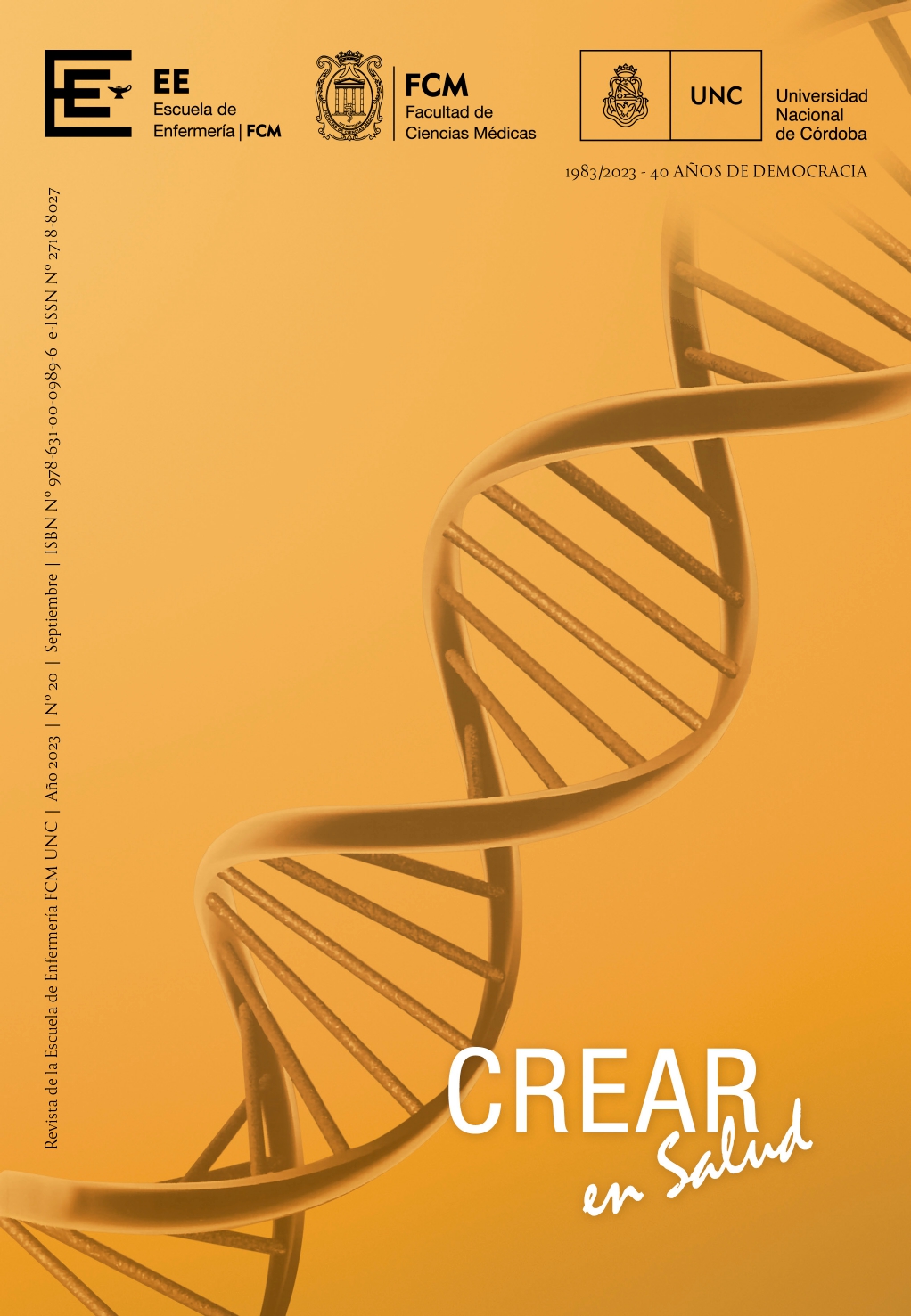Rol de Enfermería en el cuidado humanizado
Palabras clave:
Rol de la Enfermera- Atención de Enfermería- Humanismo- Enfermería de Cuidados CríticosResumen
Introducción: Las unidades de cuidados intensivos han sido concebidas como espacios cerrados, debido al riesgo y complejidad que conlleva el estado de salud de los pacientes. Ante la escasa información sobre el rol de la enfermería en la humanización del cuidado en las Terapias Intensivas de Córdoba, se planteó determinar cuál es el rol de enfermería en el cuidado humanizado en las unidades de Cuidados Intensivos de una Institución de Salud privada de Córdoba durante mayo de 2022. Material y Método: estudio cuantitativo, descriptivo y transversal. La población incluyó a 40 enfermeras/os de las unidades de cuidados intensivos del Sanatorio Allende sede Nueva Córdoba. Se utilizó el Nyberg Caring Assessment (NCA), cuestionario semi estructurado y con preguntas cerradas. Todos los datos recolectados fueron volcados en tablas Excel para su análisis mediante estadística descriptiva. Resultados y Discusión: la confianza y respeto por el otro es importante en el trabajo diario del enfermero/a al momento de entablar relaciones profesionales (67.5%). Las habilidades y conocimientos que poseen son adecuados para brindar cuidados de calidad (45.83%). Mediante tales competencias, los enfermeros/as brindan atención en todos los aspectos y necesidades biopsicosociales (40.83%). Un porcentaje demostró comprensión y percepción completa acerca del aspecto holístico del cuidado (37.50%). Reflejando así, concordancia con las afirmaciones de Watson (1999) respecto a la profundización de conexiones espirituales y relaciones interpersonales, entendiendo desde la teoría al cuidado humanizado como un proceso de interacción sujeto–sujeto basándose en valores, dirigido a: cuidar; apoyar, y acompañar al individuo en el logro, fomento y recuperación de la salud mediante la satisfacción de sus necesidades humanas, promocionando así su confort y cuidados. Conclusión: El rol de la enfermería en el cuidado humanizado se sustenta bajo un perfil de acompañamiento a la persona y atención de todas sus necesidades. La persona es un ser biopsicosocial, y el enfermero/a debe ser capaz de reconocer estos aspectos, y contar con conocimientos, destrezas y técnicas necesarias para brindar atención holística y de calidad
Referencias
Andamayo Quito, M. del P., Orosco Morales, G. S. y Torres Mejía, Y. (2017). Cuidado humanizado de la Enfermera según la Teoría de Watson, en pacientes del Servicio de Emergencia del Hospital Arzobispo Loayza, 2017 [Tesis de grado, Universidad Peruana Cayetano Heredia]
Barbosa de Pinho, L. y Azevedo dos Santos, S. M. (2006). Significados y percepciones sobre el Cuidado de Enfermería en la Unidad de Cuidados Intensivos. Index de Enfermería, 15 (54), 20-24. https://scielo.isciii.es/scielo.php?script=sci_abstract&pid=S1132-12962006000200004
Díaz Amado, E. (2017). La humanización de la salud: conceptos, críticas y perspectivas (1ed.). Pontificia Universidad Javeriana. https://www.javeriana.edu.co/documents/4578040/4715782/Humanizacion_de_la_Salud/22f8a084-b9a5-41dd-8673-487bc72b90aa
Fernández Ortega, M. A. (2004). El impacto de la enfermedad en la familia. Revista Facultad de Medicina UNAM, 47 (6), 251-254.
https://www.imbiomed.com.mx/articulo.php?id=27818
Guerrero Ramírez, R., Meneses La Riva, M. E. y De La Cruz Ruiz, M. (2016). Cuidado humanizado de enfermería según la teoría de Jean Watson servicio de medicina del Hospital Daniel Alcides Carrión Revista enfermería Herediana, 9 (2), 127-136.
https://faenf.cayetano.edu.pe/images/2017/revistavol9/9.pdf
Izquierdo Machín, E. (2015) Enfermería: Teoría de Jean Watson y la inteligencia emocional, una visión humana. Revista Cubana Enfermería, 31 (3). http://scielo.sld.cu/scielo.php?pid=S0864-
03192015000300006&script=sci_arttext&tlng=en
Pardavila Belio, M. I. y Vivar, C. G. (2012). Necesidades de la familia en las unidades de cuidados intensivos. Revisión de la literatura. Elsivier Enfermería Intensiva. 23 (2), 51-67.
Poblete Troncoso, M. C., Valenzuela Suazo, S. V. y Merino, J. M. (2012). Validación de dos escalas utilizadas en la medición del cuidado humano transpersonal basadas en la Teoría de Jean Watson. Revista AQUICHAN, 12 (1), 8-21. http://www.scielo.org.co/pdf/aqui/v12n1/v12n1a02.pdf
Ramírez Perdomo, C. A., Perdomo Romero, A. Y. y Galán González, E. F. (2013). Evaluación de la calidad del cuidado de enfermería en la Unidad de Cuidados Intensivos. Revista Avances en Enfermería, 31 (1), 42-51.
http://www.scielo.org.co/pdf/aven/v31n1/v31n1a05.pdf
Romero, Z. V. (2018). Percepción del cuidado humanizado brindado por el personal de enfermería a pacientes hospitalizados según edad y sexo
en una unidad coronaria de un efector Público de la ciudad de Rosario. [Tesis de grado. Universidad Nacional de Rosario]
http://rephip.unr.edu.ar/bitstream/handle/2133/20531/PTE2120-RomeroZV-2018.pdf?sequence=3&isAllowed=
Descargas
Publicado
Número
Sección
Licencia
Derechos de autor 2023 Crear en Salud

Esta obra está bajo una licencia internacional Creative Commons Atribución-NoComercial 4.0.



